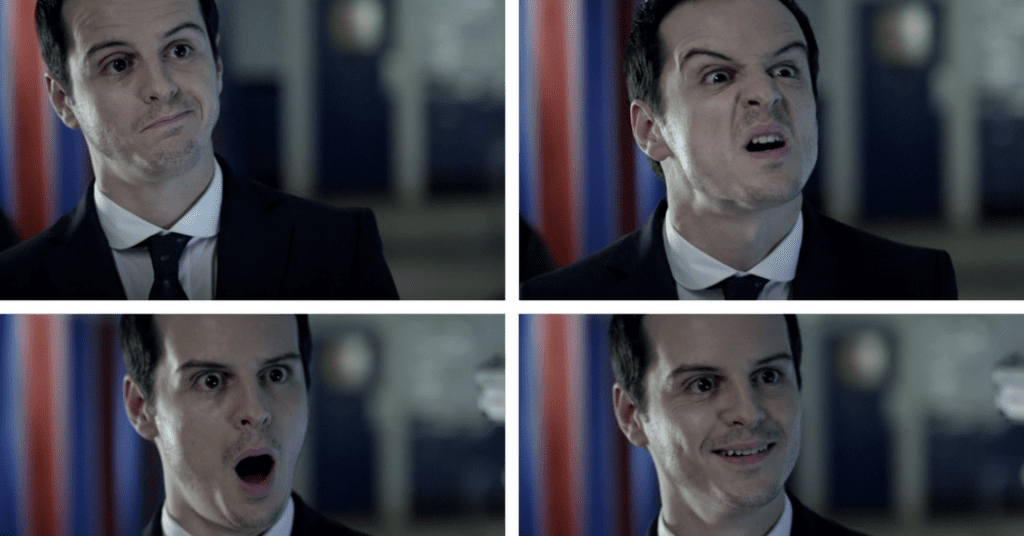There are some actors who all the time, irrespective of the dimensions of their position or the context of their efficiency, draw the attention. Andrew Scott, who has most not too long ago appeared because the slippery, scheming protagonist within the Netflix collection “Ripley,” is considered one of them. He’s enthralling to observe, his emotional notes meticulously constructed, with playful touches of chaos that all the time depart area for moments of discovery and shock.
Listed here are a couple of of Scott’s favourite modes of efficiency, and the way his standard roles replicate an actor excelling at his craft.
The Madman
In Scott’s breakout position, in “Sherlock,” he performs Moriarty, the prison mastermind reverse Benedict Cumberbatch’s modern Sherlock Holmes. From Scott’s first look, within the Season 1 finale, he electrifies an already energetic present.
Cumberbatch set the tone for “Sherlock” together with his brutal, fast-paced wit; deductions tumble out of his mouth with strict precision, and in an impersonal monotone. Scott’s arrival, and his erratic singsong talking, break this rhythm. There’s a menacing playfulness to not solely his rhetorical supply but in addition to his facial expressions. It provides a brand new dimension to the present.
Of their preliminary confrontation scene, Sherlock goals a gun at Moriarty, asking, “What if I used to be to shoot you now?” Moriarty responds with a cartoonish look of shock that begins on the prime of his head and ripples down: his eyebrows popping up, his eyes widening, jaw dropping and neck drawing again.
The rapidity with which his expressions unfold emphasize Moriarty’s dangerously fickle temperament; when he threatens Sherlock again, he speaks softly at first however then erupts midsentence, his face contorting horrendously because the timbre of his voice lowers to a grisly rasp. However simply as shortly the second is over: Moriarty returns to his lighthearted tone of villainy and excuses himself.
For as stylized a efficiency as Scott provides, it’s all the time plausible for the character, significantly on this world of grand crimes, intricate designs and eccentric genius. Sherlock is the perpetual regular drive, taking part in his violin and wandering by means of his thoughts palace, whereas Moriarty is the agent of chaos who serves as his match.
The Charmer
Probably the most distinguished ingredient of Scott’s efficiency because the so-called scorching priest in “Fleabag” is his coy smile. When he’s launched in Phoebe Waller-Bridge’s pleasant comedy-drama, at a household dinner, his smile is well mannered and disarming.
It’s when he and Fleabag are out for a cigarette break, and he casually flings an expletive at her as she walks away, {that a} boyish grin spreads throughout his face. His eyebrows elevate barely in an expression suggesting that he’s difficult her.
A part of his appeal is a matter of distinction: He’s a holy minister meant to supply religious steering, but in addition a foul-mouthed heavy drinker who can barely cover his sexual wishes. As he’s lastly about to present in and sleep with Fleabag, his mirthful smile fades, one nook of his mouth angled up in a glance of satisfaction, however there’s no pleasure behind the expression. His look is difficult and resigned to the transgression, and there’s only a shadow of his coy smile beneath.
On the finish of the collection, the priest says that he’s not sure whether or not the euphoria he’s feeling is due to God or due to Fleabag, and Scott’s efficiency clues us in to the reply. Scott’s ebullient power — that nearly manic, kinetic cost he usually imbues in his characters — comes by means of most vividly within the scenes when the priest is speaking about God. Scott’s priest, regardless of his love for Fleabag, realizes that she hasn’t altered his religion. She has strengthened it.
Scott’s appeal is on show differently within the new Audible podcast adaptation of George Orwell’s “1984.” His audio efficiency methods the senses: You possibly can, by some means, truly hear the smirk on his face as he performs O’Brien, an undercover cop posing as a revolutionary in a dystopian society. Scott leans into the lilt of his pure Irish accent, and his exaggerated shifts in pitch, together with the meticulous method he hangs every syllable on the air and marks the time with cryptic murmurs and pauses, creates a seductive thriller.
The Wounded Man
Scott’s most up-to-date big-screen position was within the 2023 movie “All of Us Strangers,” the place he exhibits how a lot melancholy he can instill in a efficiency by means of nuanced silences and stillness. He stars as Adam, a lonely homosexual screenwriter who encounters a stranger named Harry after which returns to his childhood dwelling to seek out his deceased mother and father there, simply as they have been many years earlier than.
Scott’s efficiency is muted, his eyes always contemplative, his expression that of disappointment that has hardened right into a stony exterior. Even his disappointment is restrained; in a scene during which he discusses his sexuality and childhood bullying together with his father, he’s composed and dismissive of the difficulties he has confronted till his father begins to sob. Adam’s face and higher physique then likewise crumble.
Scott’s most devastating efficiency could have been captured in a 2012 quick movie during which he performs the monologue “Sea Wall,” by Simon Stephens.
Scott performs a person recounting a private story of affection, religion and devastating loss, and realistically captures the ramblings, interruptions and deflections that individuals usually make use of in dialog. He makes use of the complete studio area behind him, wandering round, pacing, glancing out the home windows, thus making a full sense of setting round him. His mannerisms are exact and appear to deliberately create parallels in his storytelling; a big, greedy gesture can exhibit each his younger daughter reaching innocently upward and his try and summon a phrase from skinny air.
The Rogue
Within the fingers of the mistaken director and the mistaken lead actor, Tom Ripley, the sociopathic con man turned killer from Patricia Highsmith’s standard e-book collection, might simply be flattened to a typical prison. What makes Ripley extra than simply one other dangerous man within the newest mystery-thriller is his elusiveness; his Ripley is usually psychologically opaque and unpredictable.
Scott’s efficiency in “Ripley” is reserved however in no way withholding. He leaves simply huge sufficient of a window by means of which the viewers can see Ripley’s ideas and emotional reactions whereas leaving the remaining open to interpretation.
Scott’s charisma often bleeds by means of his characters, who even at their most villainous are effortlessly alluring. However Scott corks his appeal as Ripley, who isn’t suave in both his social interactions or his crimes. The stillness that this Ripley exudes barely disguises the frenetic power beneath the floor. Within the scenes during which Ripley suspects he’s about to be caught, he smiles and makes small speak, tries to loosen up his posture into a fake act of confidence. However his eyes are tense and targeted, like that of an animal recognizing a predator.
Ripley is stiff; his conversations are sometimes practiced, from his solutions to the way in which he sits. Maybe essentially the most prevalent emotion that Scott reveals on this character is disgrace. When Ripley’s unrefined style comes beneath assault — “Who on the earth would put on a purple paisley gown,” Ripley’s will-be sufferer says with a derisive chuckle — embarrassment flits throughout his face simply briefly, within the hardened creases round his mouth and a fast downward look. Then it’s gone as shortly because it appeared.



